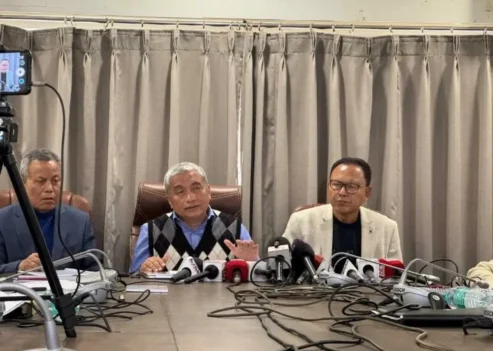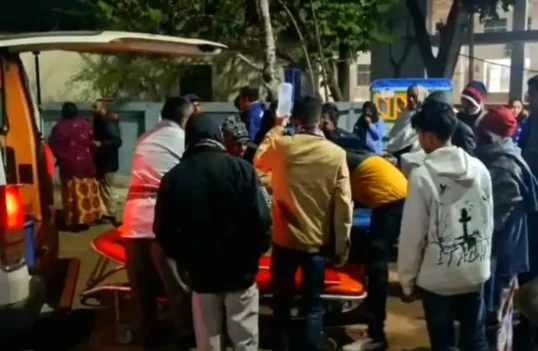The resurgence of the border haats in Tripura, located along the Indo-Bangla international border, had cast a shadow of uncertainty over the lives of local communities who relied on these vibrant markets for their livelihoods. The sudden halt of cross-border trade due to the pandemic had brought economic hardships and disrupted the age-old traditions of exchange. However, after a long and arduous three-year hiatus, the border haats at Srinagar in the Sabroom sub-division and Chhagalnaiya in the Feni district of Bangladesh have finally reopened their gates, breathing new life into the hearts and hopes of the people.
Amidst the bustling atmosphere of the reopening ceremony, senior officials from South Tripura district and Feni district stood side by side, announcing the much-awaited resumption of border haat operations. The significance of this moment was palpable, not only for the vendors and customers eagerly awaiting their chance to trade once again but for the entire community that relied on the prosperity and camaraderie fostered by these markets.
Capturing the spirit of unwavering resilience that echoed throughout the community emerges the story of Debashis Saha, a seasoned vendor and Secretary of the border haat committee. With a nostalgic twinkle in his eyes, he reminisced about the prosperous days when these markets flourished, becoming the lifeblood of the community. However, the sudden closure plunged Debashis into uncertainty and financial hardship. Despite the challenges, his spirit remained unbroken. Today, as he proudly sets up his stall once again, his resilience becomes an exemplar of the enduring human nature, ready to embrace the resurgence of trade and reclaim his path to prosperity.
Reopening the border has also given Ramesh Debnath, a 38-year-old former teacher, an opportunity to rebuild his dreams brick by brick. Debnath experienced a dramatic shift when he lost his job due to the closure of the border haats. The financial fallout pushed him to the brink, but his indomitable spirit refused to yield. With the reopening of the haats, Debnath saw a glimmer of hope and armed with a vendee permit, he now sets out to procure goods from the market, not only to secure a livelihood for his family but also to regain the sense of purpose that once fueled his days as an educator.
For Bikram Tripura, an indigenous tribal vendor from Poangbari, the closure of the border haats had far-reaching consequences. Struggling to repay a substantial loan of nearly 2.5 lakhs, Bikram found himself toiling as a labourer, yearning for a path to redemption. The reopening of the haats offered a chance to revive his faltering finances and reclaim his dignity. With renewed determination, he ventured into the bustling marketplace, seeking to restore his fortunes and rewrite the narrative of his life. Bikram’s journey symbolises the resilience and determination that reside within the hearts of those who refuse to succumb to adversity.
These tales, woven with threads of hardship and hope, epitomise the transformative power of the reopened border haats in Tripura. As these markets once again buzz with activity, nurturing the dreams and aspirations of countless individuals, they stand as a measure of the enduring spirit of resilience that runs deep within the community. The revival of the border haats not only signifies a rekindling of economic opportunities but also embodies the rebirth of a vibrant cross-border camaraderie that transcends boundaries, strengthening the bond between nations and empowering the lives of those who call these markets their own.
With a verification process in place, allowing a limited number of individuals to enter the border haats each week, the authorities are ensuring a controlled and organised environment for trade to flourish. This step provides the continued growth and stability of the border haats while prioritising the safety and well-being of all participants.
The verification process implemented by the district authorities requires individuals to present their government identity cards upon entry, ensuring transparency and security. A maximum of 1,200 people from each side of the border, totalling 2,400 individuals, will be granted access to the bustling market every Tuesday. This careful approach aims to balance facilitating trade and adhering to necessary health and security protocols.
As the border haats reclaim their position as vibrant cross-border trading hubs, communities on both sides of the border are filled with renewed optimism. Visitors from both sides have the opportunity to explore diverse handicrafts, traditional artworks, and delectable local cuisines, fostering an environment of mutual appreciation and understanding.
South Tripura’s Additional District Magistrate and Collector, Dhanbabu Reang, highlights the multifaceted impact of the border haats, stating, “The reopening of the border haats is not just a matter of commerce; it signifies the revival of livelihoods, the strengthening of bilateral relations, and the promotion of cultural exchange.” These markets have the power to transform lives and communities, and the government is committed to ensuring their sustainable growth.
As the first day of the revived border haats, the air is undoubtedly filled with a sense of newfound hope and opportunity. The vendors, traders, and visitors carry with them the promise of a brighter future. The reopening of these markets stands as a testament to the resilience and determination of the local communities, who have weathered the storm and are ready to rebuild their lives, one transaction at a time.







